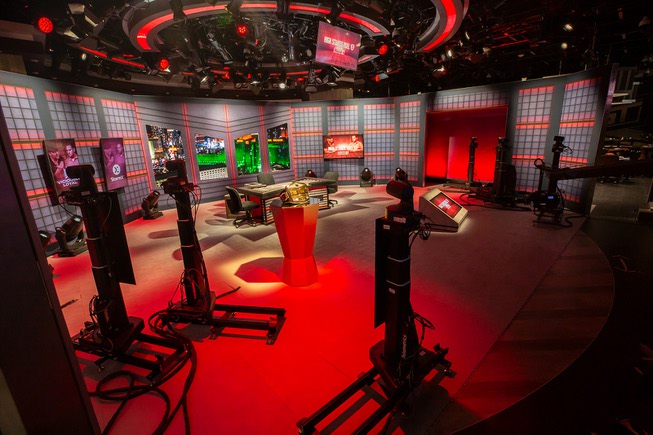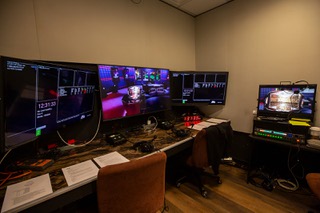Wednesday, May 18, 2022 | 2 a.m.
On a recent afternoon, Phil Hellmuth, one of the most recognizable faces in the poker world, strolled into the sprawling PokerGO Studio on the Las Vegas Strip.
The 10,000-square-foot facility at the Aria features a main studio with a Strip skyline backdrop, remote cameras and, of course, a poker table. There is also a smaller studio with a green screen and a commentary table similar to those seen on networks like ESPN or CNN.
Hellmuth was there Monday for the “weigh-in” for the taping of the “High Stakes Duel III” showdown against fellow poker pro Scott Seiver.
Hellmuth, nicknamed “The Poker Brat,” is a PokerGO ambassador who has a small piece of equity in the company, which was principally founded by businessman Cary Katz.
PokerGO will play a large role in the upcoming World Series of Poker from May 31 through July 20 at Bally’s, which is being rebranded as the Horseshoe.
PokerGO, which employs nearly 60 people, will livestream nearly two dozen gold bracelet World Series events.
In 2015, Katz, the former head of a student loan firm, founded Poker Central, which later launched the subscription-based PokerGO. The streaming service offers a mix of live events, archived videos and original programming. A yearly subscription to PokerGO costs $99.99. The company also has a quarterly subscription plan and a monthly plan for $14.99.
The idea for a one-stop poker hub website came from Katz, but the media-shy businessman — also a serious and successful poker player — was sure to surround himself with others who share a love for and commitment to the game.
Along with Hellmuth, that list includes World Series of Poker Hall of Famer Mori Eskandani, a former pro player who went on to produce some of the best-known television shows to feature the game, such as “Poker After Dark” and “Poker Superstars.”
Eskandani immigrated to the United States from Iran as a teenager in the mid-1970s. He went to college at Portland State University in Oregon, but spent much of his free time playing five-card stud in poker rooms in Vancouver, Wash.
He turned pro in 1983 and moved to Las Vegas two years later, where he began playing, by his own count, close to 50,000 hands of poker annually.
Eskandani later founded a company called Poker Productions, which was eventually acquired by Katz.
Eskandani, known around the studio as “Uncle Mori,” has been with PokerGO from the start and was named president last year. He said PokerGO’s subscription numbers increase on a weekly basis.
The company’s PokerGO Tour — think of it as equivalent of the PGA Tour in golf or the NASCAR Cup in auto racing — has also become popular after its debut last year.
Tour events — an annual champion is crowned from a final list of 21 players — start with a $10,000 minimum buy-in and can go as high as $300,000.
“Our main reason for the studio is the tour,” Eskandani said. “The winner of the PGT is truly the best player in the world.”
Eskandanisays the game continues to grow and is generally healthy, but he would like to see online poker become legal nationwide. Only a handful of states, including Nevada, allow it to be played for real money.
He said he’d also like to see the popularity of poker grow to the point where major television networks show events.
“No game drags you in like poker,” Eskandani said. “If you would have asked me in 1984 if the World Series of Poker would ever have 1,000 players, I would have laughed at you. We were getting 60 or 70 players back then. To have tens of thousands of poker players now, it’s amazing.”
Last year, the World Series of Poker boasted over 127,000 entries for its summer-long event at the off-Strip Rio.
“It’s hard to say where poker can go, but anything is possible,” Eskandani said.
Brent Hanks, a former schoolteacher from Western New York, moved to Las Vegas about 15 years ago to become a poker pro.
According to the Hendon Mob poker player database, Hanks tallied about $1.8 million in career winnings over his seven years as a pro, good for 1,097th place on the all-time money list.
In 2015, he struck up a conversation with Katz when the pair were playing at the same table at the Rio. Katz told Hanks about his vision for what would become PokerGO, and Hanks was hooked.
“I refused to stop talking to (Katz) until he hired me a few months later,” said Hanks, now the company’s program director. “I remember telling my wife that I really thought I’d be good with something like this.”
Hanks said his plan as a young man was to get an advanced degree and become a school administrator, but then “poker happened.”
“At PokerGO, we’re a subscription service similar to Netflix, and we boomed when the pandemic hit,” Hanks said. “People had nothing better to do back then. People wanted to watch poker or play poker. We picked up a ton of subscribers during that time.”
Eskandani said the pandemic “ended up creating a lot more poker players. … It’s a universal game, a great game.”


